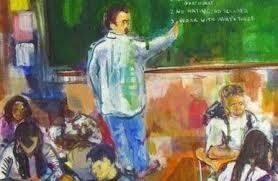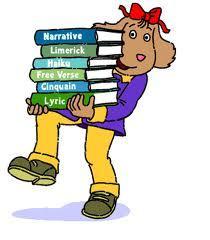Nadia Janice Brown's Blog
August 30, 2013
Is Writing Your Calling? Maybe Not!
We Are Not All Meant To Write

I know now; writing is my purpose. When I was a small girl, I had a simple wish-- to inspire people with my words. I never wanted to be a writer for the sake of being one. In fact, I'm the opposite of what I think a writer and author should be! I'm fairly quiet. Shy. Private. Reserved. So there were moments where I questioned if this was truly my calling. It wasn't something I approached hastily. If I were going to call myself a poet, a writer, the title had to be earned. I had standards for my writings, and for what I wanted to achieve.
But we are not all meant to write, and there are those who want the title, “writer,” and then, there are writers. The question is: Which are you? It's easy to go through life without knowing your purpose and to fall into a trap of pursuing what sounds impressive. Instead of doing what you were born to do, you are trying to live someone else's dream. However, you will not go far chasing dreams that were never yours!
Knowing Your Purpose
Each day you live outside your purpose, is a day wasted not pursuing your God-given dream. If you're going to call yourself a writer and author, do so knowing: not everyone who calls themselves by those titles is meant to be either one. This is not about your writing skills, or even about a writing degree. It is about knowing your purpose. Do you know yours? Can you honestly say you-know, that-you-know, that-you-know, this is what you are put on earth for? Some have revelations, dreams...about their calling. Others may have had a perpetual stirring within them, which moves them to write. This may be you, or it may not be. Only you know why you write. Only you know why you've decided to take this path.
Not all writers should be authors of books-- you could teach, work as an editor, proofreader, or work in another area in this field. These are the obvious short list of suggestions that you could pursue as a writer. If I've got you thinking, then perhaps some self-reflection is needed. Ask yourself, some necessary and needed questions. You may want to carefully consider some of these:
Have you had your article, story, or poem published by a meaningful publication?
Outside of book sales, have you ever been paid for your writings?
Have you won any contests or awards for your work?
Have you ever received a grant for writing?
Have you seen enough progress, growth, and success in your writing endeavors?
The vision you have of where you want to be as a writer and author will not come overnight; but, if you're not seeing steady progress and continuous growth in your endeavors as an author/writer, you may want to reflect on where you are going and whether this is where you should be.

I know now; writing is my purpose. When I was a small girl, I had a simple wish-- to inspire people with my words. I never wanted to be a writer for the sake of being one. In fact, I'm the opposite of what I think a writer and author should be! I'm fairly quiet. Shy. Private. Reserved. So there were moments where I questioned if this was truly my calling. It wasn't something I approached hastily. If I were going to call myself a poet, a writer, the title had to be earned. I had standards for my writings, and for what I wanted to achieve.
But we are not all meant to write, and there are those who want the title, “writer,” and then, there are writers. The question is: Which are you? It's easy to go through life without knowing your purpose and to fall into a trap of pursuing what sounds impressive. Instead of doing what you were born to do, you are trying to live someone else's dream. However, you will not go far chasing dreams that were never yours!
Knowing Your Purpose
Each day you live outside your purpose, is a day wasted not pursuing your God-given dream. If you're going to call yourself a writer and author, do so knowing: not everyone who calls themselves by those titles is meant to be either one. This is not about your writing skills, or even about a writing degree. It is about knowing your purpose. Do you know yours? Can you honestly say you-know, that-you-know, that-you-know, this is what you are put on earth for? Some have revelations, dreams...about their calling. Others may have had a perpetual stirring within them, which moves them to write. This may be you, or it may not be. Only you know why you write. Only you know why you've decided to take this path.
Not all writers should be authors of books-- you could teach, work as an editor, proofreader, or work in another area in this field. These are the obvious short list of suggestions that you could pursue as a writer. If I've got you thinking, then perhaps some self-reflection is needed. Ask yourself, some necessary and needed questions. You may want to carefully consider some of these:
Have you had your article, story, or poem published by a meaningful publication?
Outside of book sales, have you ever been paid for your writings?
Have you won any contests or awards for your work?
Have you ever received a grant for writing?
Have you seen enough progress, growth, and success in your writing endeavors?
The vision you have of where you want to be as a writer and author will not come overnight; but, if you're not seeing steady progress and continuous growth in your endeavors as an author/writer, you may want to reflect on where you are going and whether this is where you should be.
December 23, 2012
Learn How to Write Poetry
 published in Blogging Authors
published in Blogging AuthorsYou don't have to sit through hours of poetry workshops to learn how to write poetry. Get published by numerous magazines and online publications throughout the web without taking a course in poetry. The truth is you are your best teacher and if you're committed, it’s possible to learn to write poetry by applying these simple steps.
Make time to write
Start by jotting done words, phrases, habits, things of interest, your likes, and dislikes ... do this daily. It could be on any topic such as dreams, goals, sports, music, routines, etc. It is easier to write on a subject you're familiar with and one that inspires you. In any case, write what you know. The length of your poem, spelling and grammar mistakes aren't as important when you first start writing. Just write. Overtime this exercise will help structure your ideas, while at the same time increase your writing comfort. The more you write, the further your progress will be. It is essential you devote time to your writing and set aside a few hours to write each day. A closer scrutiny should be given to spelling/grammar errors as you acquire more writing experience.
Join a poetry forum - a site for amateurs to post their work and get instance feedback. Having readers comment on your work provides an incentive to write and a format that encourages you to improve. There are many sites online where beginners can submit their poetry. Here are a few:
(You can find a complete listing by searching under poetry forum.)
Everypoet.com
Netpoets.com
Writerswrite.com
poetrypoems.com
You don't have to sit through hours of poetry workshops to learn how to write poetry. Get published by numerous magazines and online publications throughout the web without taking a course in poetry. The truth is you are your best teacher and if you're committed, it’s possible to learn to write poetry by applying these simple steps.

Rewriting your poems
Once you have accumulated some work, the focus should then be on rewriting or revising your poem. A poem is not necessarily finished after you've written it. Don't be afraid to rewrite a poem six months, or a year after it’s written. How to do this? Pay close attention to grammar usage, check thoroughly for spelling mistakes or errors, and make sure you are using the right punctuation. Use grammar handbooks to help you with grammar if it is something you struggle with. Also, use a thesaurus to eliminate overused words.
For example: Use a thesaurus to avoid cliché words. A thesaurus gives you the ability to replace a commonly used word like “shine,” and substitute it with a word less frequently used like “luster” instead.
When revising, the goal is to be concise. Get rid of redundancies (that, had, would, could ...) are oftentimes not needed. Try using fewer words to illustrate a thought without disrupting the poem’s flow. Practice reading your poems aloud. Read in front of family or friends. Hearing your poem read aloud makes it easier to catch mistakes our eyes can sometimes overlook. Try it! Writing for fun is one thing, but, if you want to become a published poet you must keep this in mind.
Be descriptive
Describe, describe, describe. Show and not tell the reader what you are conveying. Become more playful and creative with language as you develop further in your writing process. Be descriptive. Have readers picture your thoughts as you express them. Avoid using vague generalization. For instance, instead of writing “she could not move around,” write “her limbs grew numb.” Here’s another example, instead of writing “she was quite scared,” write “her knees trembled.” In both illustrations used above, one tells of an emotion and the other displays an emotion. Use specific and concise words to allow the reader to visualize your thoughts.
Reading is required
You like to write and that's a good thing, however, reading is just as important in learning to write poetry. To improve your writing you must read! Many writers of poetry don't spend time reading the craft they love and often don't get published. To further advance your writing skills you must read not just your work, but also poems and poetry books from established poets. Furthermore, read books by poets you admire.
Reading poetry helps you to absorb the language, use of metaphors, imagery... If you are not familiar with the meaning of the words metaphor or imagery, be sure to understand their usage in order to apply their principles into your poetry. Otherwise how will you write what you don't understand? Reading is also a vital part of the writing process and it will provide you with an honest review of your own work.
These are essential principles to writing poetry. You won't become a poet overnight; but, with time, patience, and effort your technique will gradually improve. Once you've compiled a number of poems, it won't be long before your writings are published!
Useful Resources
www.thesaurus.reference.com
www.Yourdictionary.com
http://grammar.ccc.commnet.edu/grammar/
May 9, 2012
A Writer’s Balancing Act
 published in WOW! Women On Writing's Blog
published in WOW! Women On Writing's Blog We all know authors must wear many hats. We are booksellers, designers, webmasters, speakers, marketers… and when you are an author who owns her own business, multi-tasking becomes tricky and gets that much more difficult to accomplish. Which is why of late it’s been unsettling that I’ve missed quite a few of my deadlines – discouraging me to the point that I seriously contemplated no longer pursuing a writing career and instead concentrate exclusively on my company.
Not only am I an author of two poetry books, I also run and operate a day-to-day business that has grown considerable over the past few years; and it’s been rather difficult for me to
walk this balancing act of poet, writer, author and entrepreneur.There is a great deal of responsibility that comes with being an author, and when you add to that, actually running a small business with little staff to shoulder the work load makes it that much harder.
I reached a point I’d had enough! I was ready to call it quits out of sheer frustration at how things were going. One right after the other, writing deadlines came and went while I was preoccupied by clients, newsletters, ads, and all things business-related. It came to the point where I thought I could not possibly go on like this anymore. I was on the verge of nearly quitting when I heard the most incredible words that really stuck with me and changed my way of thinking. A pastor on television said that sometimes to accomplish your goals you have to go through a bit of discomfort. Right then and there I agreed with what was said, and those thoughts stayed with me and provided hope and encouragement.
I realize I wanted to make it work, I wanted to continue to write; and I didn’t want to give it up! I recognize how important it was to work smarter and not just harder, that I should better prioritize my work. I had to focus and be more discipline in order to accomplish what I wanted at the moment. I’ve been steadily focusing on one thing at a time and not a million stuff at once. I’m now writing more and most importantly I’ve gotten my groove back!
Published on May 09, 2012 12:19
•
Tags:
author, authors, book-marketing, book-sales, books, poets, writer, writers, writings



